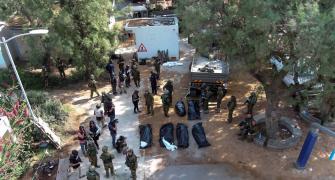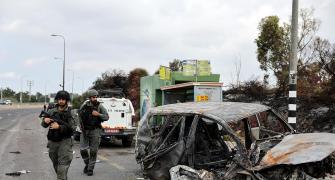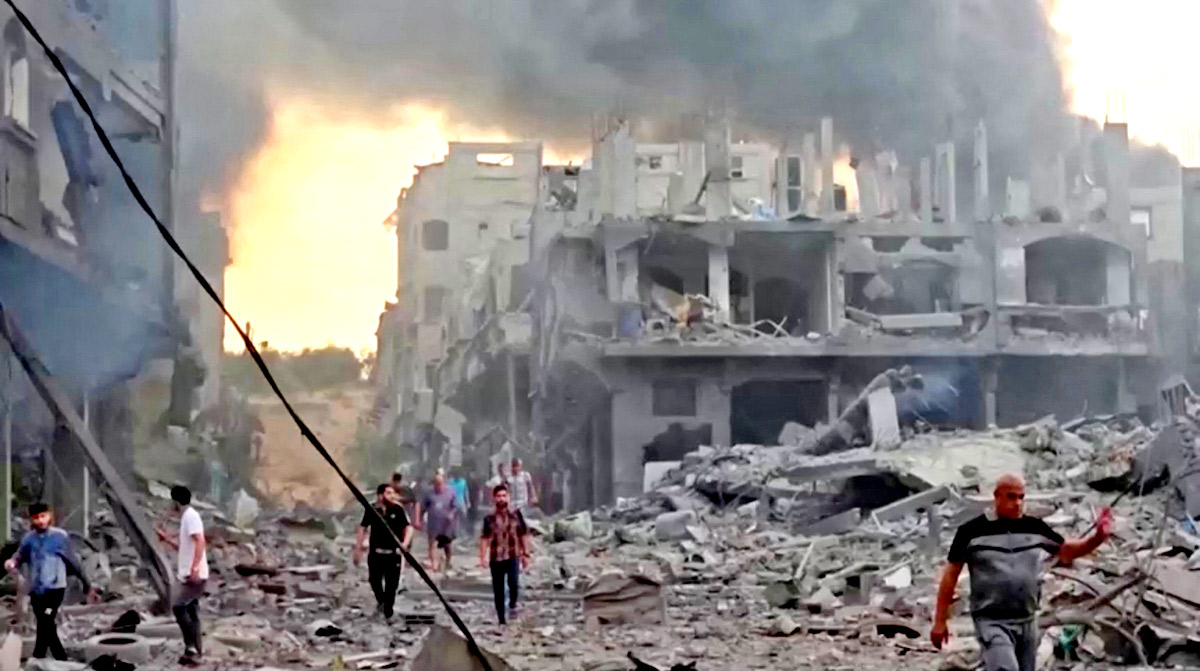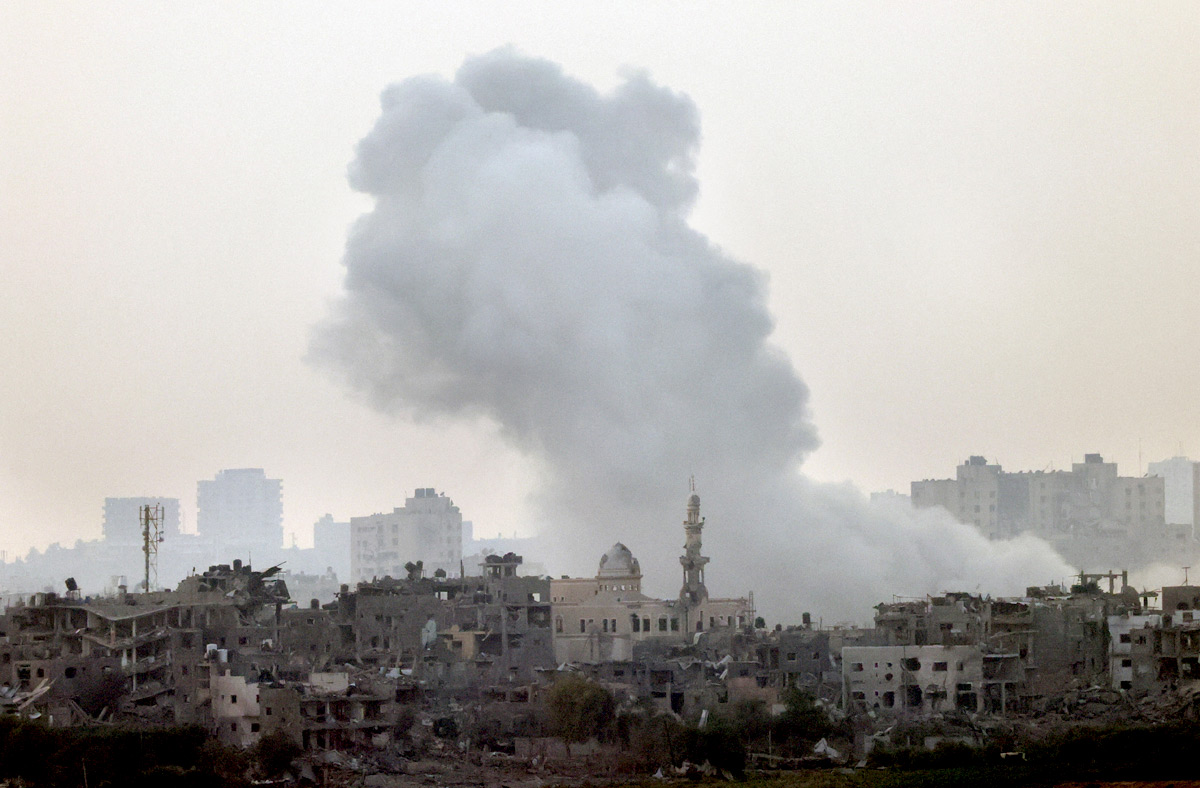Terrorism is a 'malignancy' and knows no borders, nationality or race and the world should not buy into any justification of terror acts, India has told the United Nations General Assembly as it abstained on a resolution on the Israel-Hamas conflict.

India on Friday abstained in the UN General Assembly on a Jordanian-drafted resolution titled 'Protection of civilians and upholding legal and humanitarian obligations' that called for an immediate humanitarian truce in the Israel-Hamas conflict and unhindered humanitarian access in the Gaza strip.
The 193-member General Assembly adopted the resolution that called for an immediate, durable and sustained humanitarian truce leading to a cessation of hostilities.
The resolution, which garnered 121 votes in favour, 44 abstentions and 14 member states voting against it, also demanded the immediate, continuous, sufficient and unhindered provision of essential goods and services to civilians throughout the Gaza Strip.
India's Deputy Permanent Representative to the UN Ambassador Yojna Patel, in Explanation of Vote here said in a world where differences and disputes should be resolved by dialogue, this august body should be deeply concerned at recourse to violence.
"That too, when it happens on a scale and intensity that is an affront to basic human values," Patel said.
Patel said that violence as a means to achieve political objectives damages indiscriminately and does not pave the way for any durable solutions.
Describing the terror attacks in Israel on October 7 as shocking, Patel said they deserve condemnation. India's explanation of the vote did not mention Hamas.
"Terrorism is a malignancy and knows no borders, nationality or race. The world should not buy into any justification of terror acts. Let us keep aside differences, unite and adopt a zero-tolerance approach to terrorism," she said.
India expressed hope that the deliberations of the General Assembly will 'send a clear message against terror and violence and expand prospects for diplomacy and dialogue while addressing the humanitarian crisis that confronts us'.
Patel said India is 'deeply concerned' at the deteriorating security situation and astounding loss of civilian lives in the ongoing conflict.
"The escalation of hostilities in the region will only exacerbate the humanitarian crisis. It is necessary for all parties to display the utmost responsibility," she said.
India also called for the 'immediate and unconditional release' of the hostages.
Earlier, Iraq had abstained on the resolution but later changed its vote to a yes citing 'a technical problem' at the time of voting.
Countries voting against the resolution included Israel and the United States. China, France, and Russia voted in favour of the resolution while Canada, Germany, Japan, Ukraine and the United Kingdom abstained.
The resolution called for immediate, full, sustained, safe and unhindered humanitarian access for the United Nations Relief and Works Agency for Palestine Refugees in the Near East and other United Nations humanitarian agencies and their implementing partners, the International Committee of the Red Cross and all other humanitarian organisations upholding humanitarian principles and delivering urgent assistance to civilians in the Gaza Strip.
It encourages the establishment of humanitarian corridors and other initiatives to facilitate the delivery of humanitarian aid to civilians and welcomes efforts on this.
Patel stressed that casualties in the ongoing conflict in Gaza are a telling, serious and continuing concern and it is civilians, especially women and children, who are paying with their lives.
"This humanitarian crisis needs to be addressed," Patel said, welcoming the international community's de-escalation efforts and delivery of humanitarian assistance to the people of Gaza.
She noted that India too has contributed to this effort.
India has sent 38 tonnes of humanitarian goods, including medicines and equipment to the people of Palestine.
Patel reiterated that India has always supported a negotiated two-state solution to the Israel-Palestine issue, leading to the establishment of a sovereign, independent and viable state of Palestine, living within secure and recognised borders, side by side in peace with Israel.
"For this, we urge the parties to de-escalate, eschew violence and work towards creating conditions for an early resumption of direct peace negotiations," she said.
The Jordanian-drafted resolution did not make any mention of the militant group Hamas.
Before the General Assembly voted on the resolution, the 193-member body considered an amendment proposed by Canada and co-sponsored by the US to the text.
The amendment proposed by Canada asked for inserting a paragraph in the resolution that would state that the General Assembly 'unequivocally rejects and condemns the terrorist attacks by Hamas that took place in Israel starting on 7 October 2023 and the taking of hostages, demands the safety, well-being and humane treatment of the hostages in compliance with international law, and calls for their immediate and unconditional release'.
India voted in favour of the amendment, along with 87 other nations, while 55 member states voted against and 23 abstentions.
The draft amendment could not be adopted, having failed to obtain a 2/3rd majority of members present and voting.
The adopted resolution called for the rescinding of the order by 'Israel, the occupying Power', for Palestinian civilians and United Nations staff, as well as humanitarian and medical workers, to evacuate all areas in the Gaza Strip north of the Wadi Gaza and relocate to southern Gaza.
It also called for the immediate and unconditional release of all civilians who are being illegally held captive, demanding their safety, well-being and humane treatment in compliance with international law.
It emphasised the importance of preventing further destabilisation and escalation of violence in the region and in this regard called upon all parties to exercise maximum restraint and upon all those with influence on them to work toward this objective.
Meanwhile, UN Secretary-General Antonio Guterres voiced deep concern at the humanitarian system in Gaza, saying it is facing a total collapse with unimaginable consequences for more than 2 million civilians.
Guterres noted that about 500 trucks per day were crossing into Gaza before the hostilities began but in recent days, an average of only 12 trucks per day have entered, despite needs being far greater than at any time before.
Further, the supplies that have trickled in do not include fuel for United Nations operations.
"Given the desperate and dramatic situation, the United Nations will not be able to continue to deliver inside Gaza without an immediate and fundamental shift in how aid is going in," Guterres said.
He added that the verification system for the movement of goods through the Rafah crossing must be adjusted to allow many more trucks to enter Gaza without delay.
Guterres underscored that life-saving humanitarian aid -- food, water, medicine, fuel -- must be allowed to reach all civilians swiftly, safely and at scale.
"Misery is growing by the minute. Without a fundamental change, the people of Gaza will face an unprecedented avalanche of human suffering," the UN chief said.










